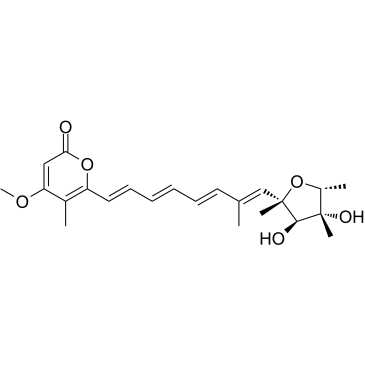(-)-Citreoviridin

(-)-Citreoviridin structure
|
Common Name | (-)-Citreoviridin | ||
|---|---|---|---|---|
| CAS Number | 25425-12-1 | Molecular Weight | 402.481 | |
| Density | 1.2±0.1 g/cm3 | Boiling Point | 585.1±50.0 °C at 760 mmHg | |
| Molecular Formula | C23H30O6 | Melting Point | 107-111℃ | |
| MSDS | USA | Flash Point | 197.7±23.6 °C | |
| Symbol |


GHS06, GHS08 |
Signal Word | Danger | |
Use of (-)-CitreoviridinCitreoviridin, a toxin from Penicillium citreoviride NRRL 2579, inhibits brain synaptosomal Na+/K+-ATPase whereas in microsomes, both Na+/K+-ATPase and Mg2+-ATPase activities are significantly stimulated in a dose-dependent manner[1]. Citreoviridin inhibits cell proliferation and enhances apoptosis of human umbilical vein endothelial cells[2]. |
| Name | (-)-citreoviridin |
|---|---|
| Synonym | More Synonyms |
| Description | Citreoviridin, a toxin from Penicillium citreoviride NRRL 2579, inhibits brain synaptosomal Na+/K+-ATPase whereas in microsomes, both Na+/K+-ATPase and Mg2+-ATPase activities are significantly stimulated in a dose-dependent manner[1]. Citreoviridin inhibits cell proliferation and enhances apoptosis of human umbilical vein endothelial cells[2]. |
|---|---|
| Related Catalog | |
| Target |
Na+/K+-ATPase[1] Apoptosis[2] |
| References |
| Density | 1.2±0.1 g/cm3 |
|---|---|
| Boiling Point | 585.1±50.0 °C at 760 mmHg |
| Melting Point | 107-111℃ |
| Molecular Formula | C23H30O6 |
| Molecular Weight | 402.481 |
| Flash Point | 197.7±23.6 °C |
| Exact Mass | 402.204254 |
| PSA | 89.13000 |
| LogP | 3.04 |
| Vapour Pressure | 0.0±3.7 mmHg at 25°C |
| Index of Refraction | 1.569 |
| Storage condition | 2-8°C |
| Symbol |


GHS06, GHS08 |
|---|---|
| Signal Word | Danger |
| Hazard Statements | H300-H311-H315-H319-H331-H335-H361 |
| Precautionary Statements | P261-P264-P280-P301 + P310-P305 + P351 + P338-P311 |
| Hazard Codes | T |
| Risk Phrases | 63-23/24/25-36/37/38 |
| Safety Phrases | 22-26-36/37/39-45 |
| RIDADR | UN 3172 |
| RTECS | UQ1235000 |
| Packaging Group | II |
| HS Code | 29322090 |
|
Co-occurrence of aflatoxins B₁, B₂, G₁ and G₂, ochratoxin A, zearalenone, deoxynivalenol, and citreoviridin in rice in Brazil.
Food Addit. Contam. Part A. Chem. Anal. Control. Expo. Risk Assess. 29(4) , 694-703, (2012) A total of 230 samples of processed rice and its sub-products or derived products were analysed to establish the co-occurrence of several mycotoxins. Samples were analysed in the period 2007-2009 due ... |
|
|
Production of citreoviridin by Penicillium citreonigrum strains associated with rice consumption and beriberi cases in the Maranhão State, Brazil.
Food Addit. Contam. Part A. Chem. Anal. Control. Expo. Risk Assess. 27(2) , 241-8, (2010) The aim of this study was to determine the levels of Penicillium citreonigrum and citreoviridin present in rice samples from Maranhão State, Brazil, where an outbreak of beriberi was reported and 32 d... |
|
|
Effect of citreoviridin and isocitreoviridin on beef heart mitochondrial ATPase.
Arch. Biochem. Biophys. 270(2) , 714-21, (1989) Citreoviridin is a toxic metabolite from fungus that has been shown to be an inhibitor of mitochondrial F1-ATPases. Studies of citreoviridin, however, have been compromised by the light-dependent isom... |
| Citreoviridin |
| 2,5-Anhydro-1,6-dideoxy-2-[(1E,3E,5E,7E)-8-(4-methoxy-5-methyl-2-oxo-2H-pyran-6-yl)-2-methyl-1,3,5,7-octatetraen-1-yl]-4-C-methyl-D-iditol |
| CITREOVIRIDIN BIOCHEMICA |
| Citreoviridin A |
| L-arabino-Hept-5-enitol, 1,4-anhydro-5,6,7-trideoxy-6-[(1E,3E,5E)-6-(4-methoxy-5-methyl-2-oxo-2H-pyran-6-yl)-1,3,5-hexatrien-1-yl]-1,2,4-tri-C-methyl-, (1R,5E)- |

